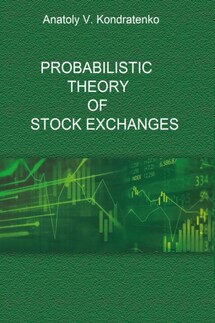Probabilistic Theory of Stock Exchanges - страница 2
The book will show that probabilistic economics provides an adequate, fairly accurate micro- and macroscopic description of the stock exchange, namely, detailed structures and mechanisms of its operation, which were studied to derive certain patterns in the work of stock exchanges, in particular patterns in the prices and trade volumes formation.
We emphasize that for the purposes of this study we made no difference between stock, commodity, currency and other exchanges; the theory developed is equally suitable for describing any exchange where assets are traded, so for brevity in this book we will talk about stock exchanges, or simply exchanges.
As a conclusion, we provide a summary of the monograph with a subjective evaluation of the results obtained and the conclusions drawn in the study. The book outlines the basics of the probabilistic theory of stock exchanges, built on the basis of probabilistic economic theory using agent quotations provided by stock exchanges. By its nature, this theory of exchanges is microscopic, so its analytical and numerical methods make it possible to calculate and describe various exchange microstructures and microprocesses. The calculations of this type were performed for the first time in this study and are also published for the first time. The main attention was paid to the calculation of market prices and trade volumes of various assets (Sberbank shares, Brent oil futures, American dollars) on the Moscow Exchange and Intercontinental Exchange Futures Europe (Brent oil futures) during one trading session, as well as a detailed comparison of the calculation results with the experimental data. This comparison demonstrates a good agreement between theory and experiment, which allows us to state that the monograph has fulfilled the main scientific purpose of the proposed study, namely, to show that the probabilistic economic theory finds experimental confirmation and, thus, acquires solid experimental justification.
This sets it apart from other economic theories of a heuristic or empirical nature. Another important purpose has also been fulfilled, namely to describe in detail the economic mechanism underlying the formation of market prices and trade volumes and serving as a bridge connecting the microscopic and the macroscopic economic world, thus demonstrating the process of macrocosm formation from microcosm, namely how the actions of exchange agents form the action and temporal dynamics of the market as a whole.
A new, universal system of exchange indices of assets, stock exchanges and the global system of exchanges has been developed. By analogy, the strategy of digitalization, forecasting and management of economies on the basis of digital platforms was developed for accumulating plans of economic agents and processing them using the formulas of probabilistic economic theory, which, if implemented, will in turn improve the quality of public administration of the economy of individual countries and the world as a whole.
The monograph demonstrates the importance and significance of stock exchanges as experimental economic laboratories, aimed primarily at testing models, evaluating parameters of models and, ultimately, verifying the existing and new economic theories. While the construction of probabilistic economic theory as an «empirical» laboratory was to a certain extent backed up by the business, the practical 25-year experience of management of which was formalized by the mathematical body of theoretical physics, the development of probabilistic theory of stock exchanges in the study was based on MOEX and ICE as experimental economic laboratories. Step by step, the monograph reveals the enormous prospects for the further use of stock exchanges as powerful up-to-date experimental economic laboratories, which allow us to argue that just as theoretical physics emerged from the science of the solar system some 300–500 years ago, in the near future a modern economic science, consisting of closely interacting theoretical economics and experimental economics, will emerge from the development of stock exchange theory based on exchange experiments that will match all generally accepted standards for physical sciences, while remaining a human and social science.







